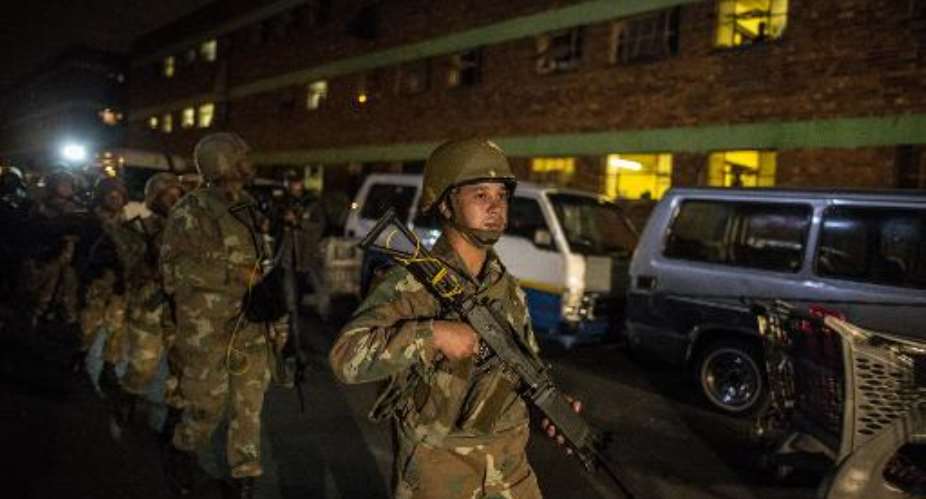Johannesburg (AFP) - South African authorities arrested 11 men in a raid on a hostel in downtown Johannesburg, officials said Wednesday, as troops were sent in to support police in a crackdown on deadly immigrant attacks.
The raid late on Tuesday came hours after Defence Minister Nosiviwe Mapisa-Nqakula said the army was deployed as a "last resort" after weeks of unrest that have left at least seven people dead.
As a helicopter hovered overhead, dozens of soldiers surrounded the workers' hostel and police stormed inside the building, which has been a hotspot for xenophobic clashes in the city.
Officers moved from floor to floor conducting searches as residents lay face down in corridors.
"Eleven suspects were arrested in Jeppe hostel for possession of dagga (cannabis) and stolen property, aged between 24 and 49," police spokesman Solomon Makgale said.
Mobs of South African men in Johannesburg and in the port city of Durban have targeted migrants from Zimbabwe, Malawi, Mozambique and other African countries over the past three weeks.
The government stepped up its response by deploying troops to back the police, even though attacks have fallen in recent days.
The involvement of soldiers was criticised by the opposition Economic Freedom Fighters party as a overreaction and a misuse of the military.
"(The) government is losing control over society and now resorting to extreme measures in the same manner done by the apartheid regime," it said.
"Soldiers and armies all over the world are trained to kill, and we will not be shocked when instead of keeping peace in the townships, there are casualties."
- Tarnished image -
The spate of attacks has revived memories of xenophobic bloodshed in 2008, when 62 people were killed, tarnishing South Africa's post-apartheid image as a "rainbow nation" of different groups living in harmony.
The South African army was deployed to restore order in the 2008 unrest, and was also used against violent strikers in 2012.
Immigrants are often the focus of resentment among poor South Africans, who face chronic job shortages with youth unemployment at over 50 percent.
Jessie Duarte, spokeswoman for the ruling ANC, said the targeting of migrants was "well organised and coordinated" and that the army would only play a supporting role in preventing unrest.
"The army is there to assist the police (and) to ensure police are able to conduct searches," she told a press conference on Wednesday.
"The issue we have here is poverty, inequality and unemployment -- it is huge for us."
Bene M'Poko, the Democratic Republic of Congo ambassador, told reporters at the event that the violence threatened South Africa's reputation for tolerance.
"This is a sad day for South Africa... and also for the continent," he said.
"The deployment of the army indicated that police are overwhelmed."
President Jacob Zuma will hold talks on Thursday with groups representing foreign nationals living in South Africa.
"The meeting is part of building lasting partnerships... to ensure that the shameful attacks on foreign nationals do not recur," his office said.
Regional relations have been strained by the attacks, with Zimbabwe, Malawi and Mozambique organising for some worried citizens to return home.
Neighbouring Mozambique said more than 2,000 citizens had fled the violence.





 SSNIT must be managed without gov’t interference – Austin Gamey
SSNIT must be managed without gov’t interference – Austin Gamey
 Ejisu by-election could go either way between NPP and independent candidate — Gl...
Ejisu by-election could go either way between NPP and independent candidate — Gl...
 We never asked ministers, DCEs to bring NPP apparatchiks for returning officer r...
We never asked ministers, DCEs to bring NPP apparatchiks for returning officer r...
 No one denigrated the commission when you appointed NDC sympathizers during your...
No one denigrated the commission when you appointed NDC sympathizers during your...
 Used cloth dealers protests over delayed Kumasi Central Market project
Used cloth dealers protests over delayed Kumasi Central Market project
 A/R: Kwadaso onion market traders refuse to relocate to new site
A/R: Kwadaso onion market traders refuse to relocate to new site
 Dumsor: Corn mill operators at Kaneshie market face financial crisis
Dumsor: Corn mill operators at Kaneshie market face financial crisis
 Jamestown fishermen seek support over destruction of canoes by Tuesday's heavy d...
Jamestown fishermen seek support over destruction of canoes by Tuesday's heavy d...
 Election 2024: EC to commence voter registration exercise on May 7
Election 2024: EC to commence voter registration exercise on May 7
 Public schools rebranding: We’re switching to blue and white, we’re painting all...
Public schools rebranding: We’re switching to blue and white, we’re painting all...
